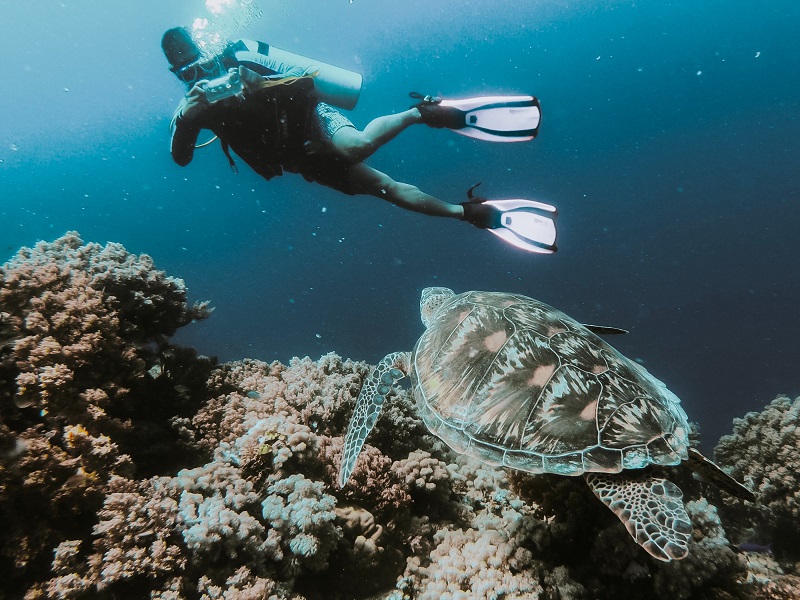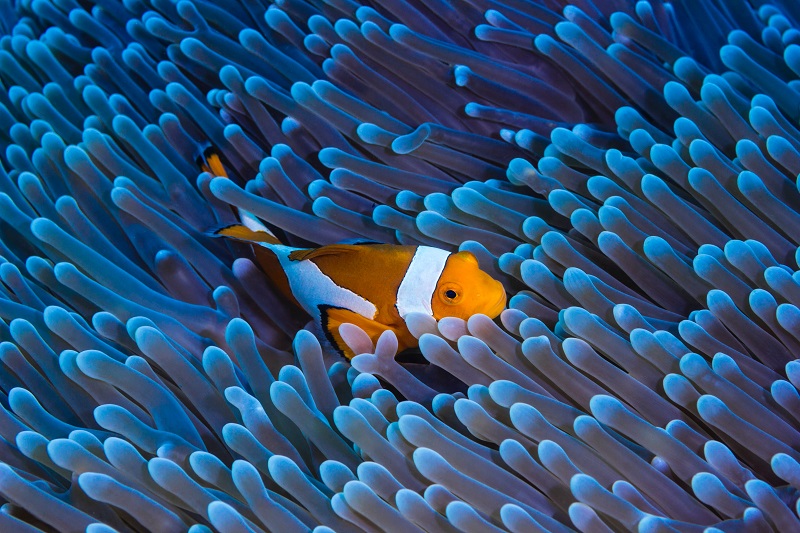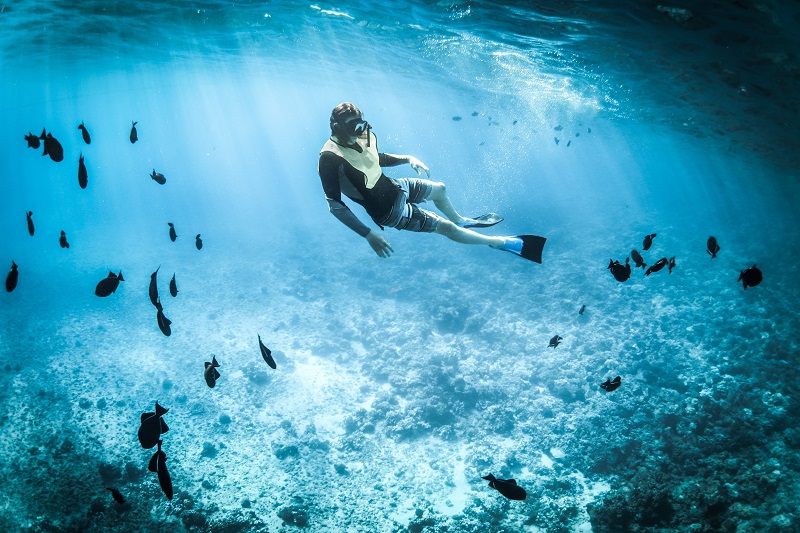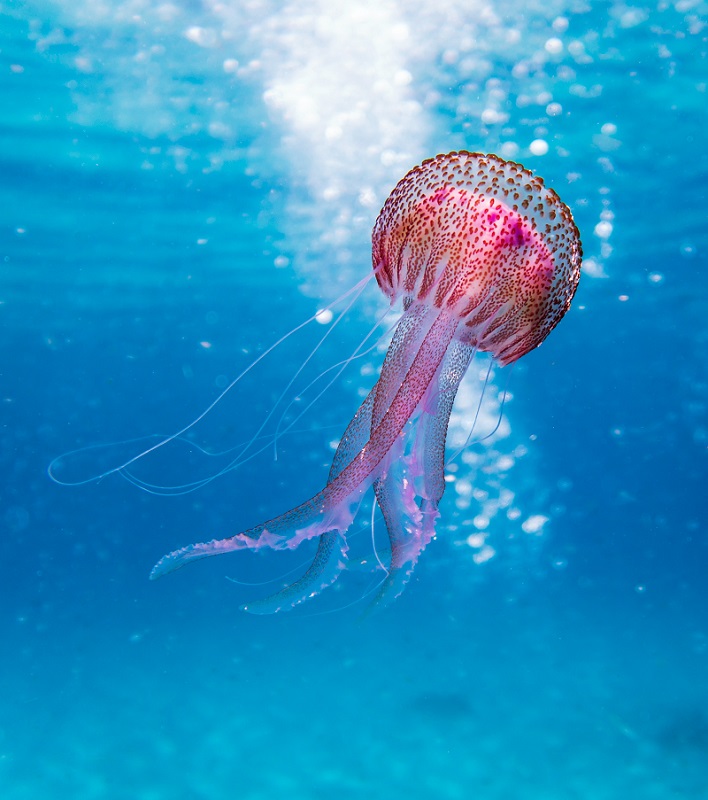This article might have some affiliate links. If you buy through those links it would help me without any additional cost to you. Thanks.
“Sink beneath the surface, and you are free.”

Snorkeling and scuba diving are two of the most popular water sports in the world. Both activities allow swimmers to explore the ocean, see underwater wildlife and take in the sights and sounds of an aquatic environment without having to swim at extreme depths.
Both require special training, equipment, and practice to achieve proficiency. However, there are some major differences between the two that make each one unique.
Today we have brought to you an article which explains the major elements that differentiates between the two activities.
Let’s go!
Snorkeling and Scuba Diving – Explained
What is Snorkeling?
Snorkeling is a form of underwater diving in which the swimmer wears a mask with a breathing tube (or occasionally mouthfill), and sometimes a dive computer, enabling the swimmer to look through the water while at the surface.

Simply put, It’s basically swimming with your face in the water, and breathing through a snorkel tube. You can use fins to help you move around, or just kick. It’s easy to learn, fun to do and is available almost everywhere. Also you can return to the surface easily.
If you’re going on vacation and thinking about spending some time on best beaches in the world, snorkeling is something that should definitely be on your list of fun outdoor activities to try.
History
Snorkeling is one of the fastest growing water sports around. Along with that, it also is one of the oldest. It was invented in ancient Greece and has been enjoyed by many ever since.
The first snorkel-like device was actually a hollowed out reed that was used to breathe while swimming underwater in the Nile River in Egypt over 5,000 years ago.
The Snorkel was invented in 1825 by a Welshman named Sir John Roberts. It was first used by early 20th century fishermen who wanted to catch fish while keeping their heads above water to observe their surroundings and avoid sea monsters lurking below the surface.
What is Scuba Diving?
Scuba diving is an activity where you take scuba lessons, go under water and explore aquatic life. Scuba divers carry their own source of breathing gas, usually compressed air, allowing them greater independence and freedom of movement than surface-supplied divers.

Scuba diving is a sport that requires training and dedication. If the diver is interested in getting certified, then they need to pass a series of tests.
The best way to improve as a diver is by joining scuba clubs and taking part in events like competitions, which can be really fun and rewarding.
Useful resources: How to Scuba Dive?
History
Diving has been an important part of human history since the dawn of time. It’s one of the most peaceful and enjoyable activities anyone can do, but it didn’t start out like that.
Scuba diving has been around since the mid-20th century, but its origins can be traced back further to around 400 B.C.. In 399 B.C., Aristotle wrote about Underwater hunting in his book “History of Animals”. Since then, people have been fascinated with underwater exploration and the idea of diving.
Frenchmen Jacques-Yves Cousteau and Émile Gagnan developed the first prototype of modern scuba equipment, the Aqua-lung, which was first invented for use by the navy on a rescue mission in October 1942. Cousteau also designed the first Aqua-Lung that allowed breathing for a longer period and go deeper and stay underwater.
After that, many other great minds worked more to upgrade upon the idea to create what we know today as the activity of Scuba Diving.
Major Differences Between Snorkeling and Scuba Diving
The two most popular ways to explore the underwater world are snorkeling and scuba diving. Both have their benefits, but they are completely different experiences.

While, Snorkeling is an awesome way to explore the world beneath the surface without having to go through any kind of training to enjoy it. Snorkels are simple, inexpensive, available everywhere, relatively safe and incredibly fun. On the other hand, Scuba Diving is more complex, expensive, dangerous and only possible in certain locations around the world.
Snorkeling and scuba diving are very much alike, but there are a couple of important differences. They both involve breathing underwater, and they both allow the user to explore the ocean and its many wonders. Their similarities end there, though.
Let’s Differentiate, People!
What it Offers
Snorkeling and Scuba Diving both are world popular underwater experience activities and can be similar in many ways. But the number one thing that differentiates between the two water sports, is what they have to offer.

While snorkeling offers you an underwater experience while positioning you at the surface and letting you watch the coral activities and aquatic wildlife which can be seen around the surface, a scuba diving experience is considered to be a more upgraded version of the snorkel experience.
A scuba diver gets to explore the depths of the water body and swim around along with the fishes, see coral bodies situated underneath the surface and sometimes even below that.
Another difference in between these water sports is that although both are a recreational activity, scuba diving also has a commercial use and value. I mean, it was first introduced for a rescue mission, right. It is also utilized for official purposes like underwater welding, offshore construction activities, etc.
Equipment
While the Snorkeling activity needs only a few equipment to indulge in the activity like a snorkeling gear, a mask and sometimes swim fins as well. On the other hand, a Scuba Diver needs to have a diving mask, a compressed gas cylinder to help them breath in the deep waters, a diving suit, a regulator mouthpiece, and fins.
You can use a swim set to practice it anywhere in a pool or smaller water body.

Since snorkeling does not involve an in depth experience of aquatic life and mostly remains at the surface of the water body, we do not need stuff like a gas cylinder attached to our back or a proper suit for the activity. We can catch glimpses of the aquatic world from the surface while breathing by pulling our head out of the water – it’s simple.
Whereas, a Scuba Diver needs to have the said equipment with them to get in more depth and experience the underwater world from the inside. The regulator attached with the compressed gas cylinder makes the divers breath directly and thus lets them be underwater for longer intervals of time.
Breathing Techniques
As snorkeling gathered more adventure seekers from different parts of the world and started to get recognized more and more, it also upgraded. Now, the people started to go deeper inwards the water body to experience the life underwater closely.

Unlike scuba diving, snorkeling can only give you so much of a range when talking about deep diving. When wanting to deep dive, the snorkelers need to hold their breath and go inside and come back again for another round.
Keep in Mind – Snorkelers are provided with a snorkel with a breathing tube attached to it as well. Which is a great equipment when watching the sea life from the surface. But when you go deep, the breathing tube must be detached or it will fill up and could be dangerous.
PS – If you do not know how to swim, it’s recommended to not try and go inside the surface.
As for the Scuba Divers, breathing is not much a problem. During the training, the scuba coach will tell you the technique on how to control your breathing pattern and also how to use the breathing cylinder or a scuba tank.
You basically do not need to hold your breath while scuba diving, the regulator is used to breath in through the tank.
Duration
While snorkeling at the surface, you can enjoy for a long time and catch glimpses of the sea life visible from there. If you want to get deeper, the time would be much lesser as you would need to come above the surface to breath.

On a scuba diving experience, however, you can enjoy longer and deeper experiences of the marine life. You do not need to hold your breath (which can also be dangerous if you try to do that while wearing a regulator).
One thing to keep in mind is that the deeper you explore, the faster your tank will be emptied. Still, having a scuba experience gives you much more time under the surface than snorkeling can.
Underwater Experience
When indulging in a Snorkeling Experience, you do not need to have any prior training or experience to enjoy it and take back couple of memorable moments underwater.

While, when it comes to scuba diving, it is much more complex than snorkeling. You need to have a few days of training before you can experience the activity. You cannot just head to a beach and participate, the training is a must.
Basically, snorkeling is comparably a lot easier to do and does not require any certification for the experience whereas scuba diving does.
Although being perfect or even basic in swimming is not necessary for either of the two activities, it would still be safer for you to learn the basics of swimming to have a much smoother experience.
Snorkeling vs Scuba Diving – Which is better?
After discussing what Snorkeling and Scuba Diving basically are and how they are different from each other, now many of our minds would ponder upon the question – “Which is better?” or “Which one to choose?“
The answer to these type of questions could be a little complex. It totally depends on several factors.
- Safety – For example, some people who might be interested in a safer option for catching glimpses of the world under the surface, might choose snorkeling, while people with more adventurous enthusiasm would like to have a deeper experience of the marine life and would opt for scuba diving.
- Timing – Another important factor that could act as a choice maker, would be the timing. As mentioned earlier, scuba diving comes with a few days of training and certification. You need more days in your itinerary if you are trying to include the activity in your travel plans. On the other hand, snorkeling does not ask for any training and can be indulged in then and there.
- Pricing – One of the most important factors when choosing between snorkeling and scuba diving is to keep the cost of the activity in mind. Now, since snorkeling needs less equipment, no training, etc. it remains to be the one which is much cheaper when compared to a scuba diving experience.
- Overall Experience – Finally, when taking into account the overall experience of the activity – while snorkeling gives you a glimpse into the life underwater, scuba diving takes you deep within to feel much closer to the aquatic life that happens to live and grow beneath the surface. Scuba diving requires training and is hands down a much deeper experience – literally and mentally as well.
Conclusion – Snorkeling and Scuba Diving

If you’re interested in seeing the surface aquatic wildlife, snorkeling is a great option. It’s also cheaper than scuba diving, and it doesn’t require any special training. For those reasons, snorkeling can be a great first-time adventure for anyone looking to explore the underwater realm. If you want to see even more of the ocean life around you, though, scuba diving may be your best choice!
Whether you prefer to explore shallow coral reefs or deep sea dive, both activities offer an amazing experience and should not be missed.
This article has covered the basic differences between snorkeling and scuba diving. We hope you found it useful!
“Like” our page, follow us to get notified for new content like this and comment below with any questions or thoughts about these two aquatic activities.
That’s All Folks!





Great blog, very informative
Thanks 😍
Good points i appreciate your comparison, the detailed information given in your blog is very helpful…
Yayyy!!
[…] to learn more about Scuba diving and how is it different from Snorkeling? Read our blog about Snorkeling vs Scuba Diving […]
[…] This archipelago is renowned for clear warm waters, coral reefs and rich marine diversity making Zanzibar a perfect under-water destination for snorkeling and scuba diving. […]
[…] Snorkeling at Agatti Island: […]